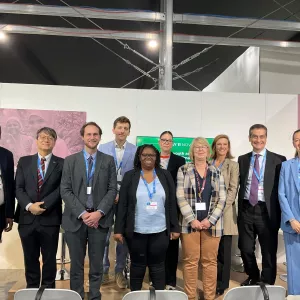Experts call for integrated, multisectoral approach in food systems transformation in COP session
BAKU, Azerbaijan (21 November 2024) – In the face of mounting challenges from climate change, biodiversity loss, and global food insecurity, experts at COP 29 emphasized the critical need for transforming food systems and how a multisectoral approach to climate action can help countries achieve Nationally Determined Contributions (NDCs), National Biodiversity Strategies and Action Plans (NBSAPs), and advance the global

Experts call for integrated, multisectoral approach in food systems transformation in COP session
BAKU, Azerbaijan (21 November 2024) – In the face of mounting challenges from climate change, biodiversity loss, and global food insecurity, experts at COP 29 emphasized the critical need for transforming food systems and how a multisectoral approach to climate action can help countries achieve Nationally Determined Contributions (NDCs), National Biodiversity Strategies and Action Plans (NBSAPs), and advance the global Sustainable Development Goals (SDGs).
The panel session, “ Harvesting Change: Sustainable Food Systems for Climate and Biodiversity Solutions ,” was a side event during the 29th Conference of Parties in Baku, Azerbaijan. Hosted by CGIAR and FAO, it brought together a diverse group of panelists, participants, and stakeholders from various sectors to share their knowledge and insights, including the Global Alliance for Improved Nutrition (GAIN), European Institute of Innovation & Technology (EIT) Food, Proveg International, World Wildlife Fund (WWF), Mercy for Animals, the Ministry of Fisheries and Water Resources of The Gambia, food packaging company Tetra Pak, and CGIAR centers WorldFish, International Water Management Institute (IWMI), and the International Rice Research Institute (IRRI).
Reimagining food systems
During the discussion, the transformation of food systems emerged as a cornerstone for addressing global challenges. Panelists called for a food systems approach, which connects agricultural production, distribution, and consumption to environmental and societal goals. This holistic perspective emphasizes collaboration across sectors, actionable governance mechanisms, and policies that promote sustainability. Countries were encouraged to develop National Food Pathways, integrated strategies prioritizing co-benefits such as reducing greenhouse gas emissions while improving nutrition.
Gender and cultural sensitivity were also discussed. FAO Deputy Director Nancy Aburto spoke about FAO-led initiatives in South Sudan that integrated women’s empowerment with small-scale farming to improve nutrition and resilience. Similarly, school feeding programs in several countries incorporating locally sourced fish provided stable markets for…

